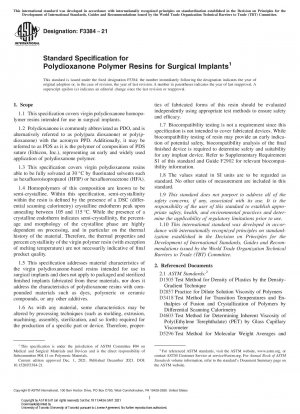ASTM F3384-21
Standard Specification for Polydioxanone Polymer Resins for Surgical Implants
- Standard No.
- ASTM F3384-21
- Release Date
- 2021
- Published By
- American Society for Testing and Materials (ASTM)
- Latest
- ASTM F3384-21
- Scope
- 1.1 This specification covers virgin polydioxanone homopolymer resins intended for use in surgical implants. 1.2 Polydioxanone is commonly abbreviated as PDO, and is alternatively referred to as poly(para dioxanone) or poly(ρdioxanone) with the acronym PPD. Additionally, it may be referred to as PDS as it is the polymer of composition of PDS suture (Ethicon, Inc.), representing an early and widely used application of polydioxanone polymer. 1.3 This specification covers virgin polydioxanone resins able to be fully solvated at 30 °C by fluorinated solvents such as hexafluoroisopropanol (HFIP) or hexafluoroacetone (HFA). 1.4 Homopolymers of this composition are known to be semi-crystalline. Within this specification, semi-crystallinity within the resin is defined by the presence of a DSC (differential scanning calorimetry) crystalline endotherm peak upon annealing between 105 and 115 °C. While the presence of a crystalline endotherm indicates semi-crystallinity, the percentage and morphology of the crystalline phase are highly dependent on processing, and in particular on the thermal history of the material. Therefore, the thermal properties and percent crystallinity of the virgin polymer resin (with exception of melting temperature) are not necessarily indicative of final product quality. 1.5 This specification addresses material characteristics of the virgin polydioxanone-based resins intended for use in surgical implants and does not apply to packaged and sterilized finished implants fabricated from these materials, nor does it address the characteristics of polydioxanone resins with compounded materials such as dyes, polymeric or ceramic compounds, or any other additives. 1.6 As with any material, some characteristics may be altered by processing techniques (such as molding, extrusion, machining, assembly, sterilization, and so forth) required for the production of a specific part or device. Therefore, properties of fabricated forms of this resin should be evaluated independently using appropriate test methods to ensure safety and efficacy. 1.7 Biocompatibility testing is not a requirement since this specification is not intended to cover fabricated devices. While biocompatibility testing of resin may provide an early indication of potential safety, biocompatibility analysis of the final finished device is required to determine safety and suitability for any implant device. Refer to Supplementary Requirement S1 of this standard and Guide F2902 for relevant biocompatibility information. 1.8 The values stated in SI units are to be regarded as standard. No other units of measurement are included in this standard. 1.9 This standard does not purport to address all of the safety concerns, if any, associated with its use. It is the responsibility of the user of this standard to establish appropriate safety, health, and environmental practices and determine the applicability of regulatory limitations prior to use. 1.10 This international standard was developed in accordance with internationally recognized principles on standardization established in the Decision on Principles for the Development of International Standards, Guides and Recommendations issued by the World Trade Organization Technical Barriers to Trade (TBT) Committee.
ASTM F3384-21 Referenced Document
- ASTM D1505 Standard Test Method for Density of Plastics by the Density-Gradient Technique
- ASTM D2857 Standard Practice for Dilute Solution Viscosity of Polymers
- ASTM D3418 Standard Test Method for Transition Temperatures of Polymers By Differential Scanning Calorimetry
- ASTM D4603 Standard Test Method for Determining Inherent Viscosity of Poly(Ethylene Terephthalate) (PET) by Glass Capillary Viscometer
- ASTM D5296 Standard Test Method for Molecular Weight Averages and Molecular Weight Distribution of Polystyrene by High Performance Size-Exclusion Chromatography
- ASTM E1142 Standard Terminology Relating to Thermophysical Properties
- ASTM E1252 Standard Practice for General Techniques for Obtaining Infrared Spectra for Qualitative Analysis
- ASTM E1356 Standard Test Method for Assignment of the Glass Transition Temperatures by Differential Scanning Calorimetry or Differential Thermal Analysis
- ASTM E1994 Standard Practice for Use of Process Oriented AOQL and LTPD Sampling Plans
- ASTM E2977 Standard Practice for Measuring and Reporting Performance of Fourier-Transform Nuclear Magnetic Resonance (FT-NMR) Spectrometers for Liquid Samples*, 2023-01-01 Update
- ASTM E473 Standard Terminology Relating to Thermal Analysis
- ASTM E793 Standard Test Method for Enthalpies of Fusion and Crystallization by Differential Scanning Calorimetry
- ASTM E794 Standard Test Method for Melting and Crystallization Temperatures by Thermal Analysis
- ASTM E967 Standard Practice for Temperature Calibration of Differential Scanning Calorimeters and Differential Thermal Analyzers
- ASTM E968 Standard Practice for Heat Flow Calibration of Differential Scanning Calorimeters
- ASTM F1925 Standard Specification for Virgin Poly(L-Lactic Acid) Resin for Surgical Implants
- ASTM F2902 Standard Guide for Assessment of Absorbable Polymeric Implants
- ASTM F748 Standard Practice for Selecting Generic Biological Test Methods for Materials and Devices
- ISO 10993-1 Biological evaluation of medical devices - Part 1: Evaluation and testing within a risk management process
- ISO 11357 Plastics - Differential scanning calorimetry (DSC) - Part 8: Determination of thermal conductivity
- ISO 80000-9 Quantities and units — Part 9: Physical chemistry and molecular physics — Amendment 1
ASTM F3384-21 history
- 2021 ASTM F3384-21 Standard Specification for Polydioxanone Polymer Resins for Surgical Implants
